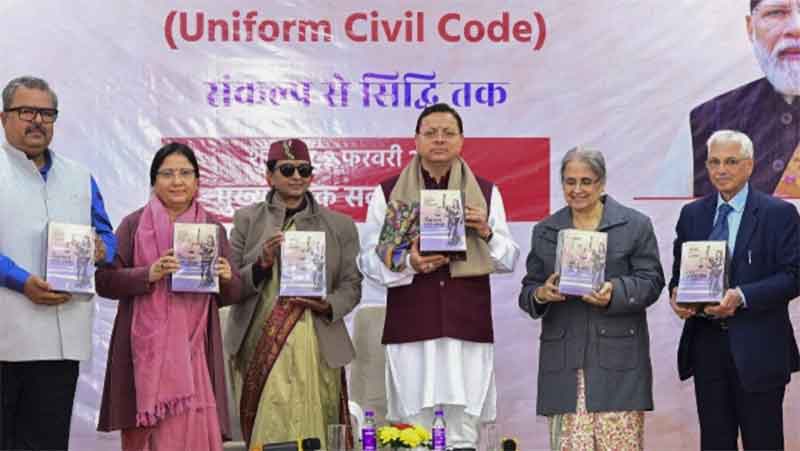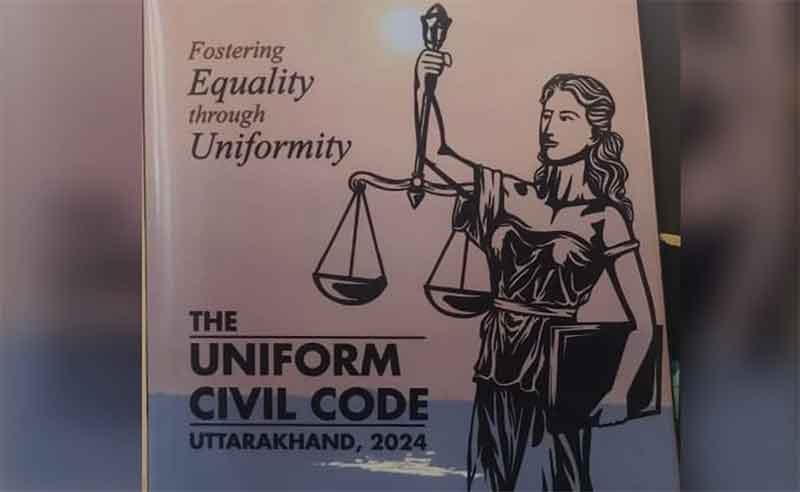
The recent bill tabled by the BJP-led government in Uttarakhand, which claims to be implementing the Uniform Civil Code (UCC), is potentially a serious threat to the citizens’ right to privacy, conscience and personal liberty.
The bill’s claim of being a uniform code is squarely negated by the fact that the members of the Scheduled Tribes are excluded from its scope. Here it is worth remembering that every section of society already has its unique customary practices and personal laws that are protected under the Constitution of India.
Therefore, any attempt to enforce a uniform civil code without duly conducting exhaustive consultations and building robust consensus across the country is tantamount to being undemocratic and unconstitutional.
The proposed legislation renders a scope for it to become an instrument of policing the strictly private sphere of citizens at the hands of the government, thereby resulting in direct curtailment of privacy, individual freedom, personal liberty and marital and family relations. Needless to argue, that this, in turn, threatens the cardinal principles of the Indian Constitution, including the ‘right to privacy’, the ‘right to life’, and the ‘freedom of conscience’.
More worryingly, the bill includes provisions that turn the civil wrongs of citizens into criminal offenses. For example, the failure to register a live-in relationship within one month of its commencement, has been criminalised, with a punishment of up to three months in jail or a fine of up to 10,000 INR.
Indeed, the bill is a potentially harmful political instrument disguised as a legal framework. It can target citizens whose personal choices do not align with the government’s dominant Hindutva ideology; for instance, those citizens who do not want to sign up for the institution of marriage.
Further, it contains provisions that restrict women’s personal freedom and sexual autonomy, perpetuating gender injustice and patriarchy. For example, women who opt for live-in relationships would be compelled to make their private and romantic choice public through registration with the office of the Registrar.
The Registrar would be empowered to conduct a ‘‘summary inquiry’’ and to this effect, s/he can summon the ‘‘live-in partners’’ or ‘‘any other persons’’ for ‘‘verification’’. Further, the Registrar would be duty-bound to send the record to the jurisdictional police authorities. Moreover, after registration, the names of individuals will be published on a public website on the Internet.
This, indeed, can open the floodgates of exposing private citizens not only to the whims of government functionaries and police authorities but also to the might of the vigilante groups that routinely resort to violence and moral policing currently in India, much akin to the ones that hit the headlines for violently targeting young couples during Valentine’s Day.
Additionally, if young adults, who are under 21, wish to live together, they will be required to surrender their privacy and autonomy to the moral and authoritative control of their parents. The Registrar’s legal obligation to notify parents right after registration if one of the partners is under 21 is a clear violation of their rights.
Section 15 of this bill raises serious concerns as it allows for the public display of marriage and divorce registration information. This is in direct violation of citizens’ right to privacy, a fundamental right recognised under international law which has been legally protected by the Supreme Court ruling in the case of Justice K.S. Puttaswamy and Anr. versus Union of India. In this ruling, it was held that disclosing personal information, which has no bearing on public interest, would constitute an unjustifiable invasion of an individual’s privacy.
Indeed, the so-called progressive provisions of the bill are of no consequence as they do not grant any additional rights to citizens. For example, one such provision suggests that children born out of wedlock under a live-in relationship would be considered legitimate, but the truth is that children born outside of marriage are already recognised as legitimate according to contemporary Indian legal jurisprudence. This has been a well-established legal precedent for quite some time.
Similarly, in case a woman is deserted by her live-in partner, she has the right to claim maintenance from her partner. It is important to note that women who face any kind of injustice within a live-in relationship can demand maintenance from their live-in partners as per the Domestic Violence Act of 2005. This Act grants women the right to demand maintenance if they were or are in a ‘domestic relationship’ formed on the lines of marriage.
Indeed, in the name of protecting women, these provisions are a parochial and patriarchal means of imposing control over the individuality, personal liberty and sexual autonomy of women. There will be several groups of women who themselves would not want to get such “protection” from the State as they would be required to relinquish their personal freedom.
In this context, it can well be argued that the proposed legislation, on several counts, is anti-women and is clearly in alignment with the larger political philosophy of the RSS-BJP which essentially views the role of women on the lines of ‘‘nature’’ and ‘‘care’’, that of ‘‘birth giver’’, ‘‘caregiver’’ and ‘‘comfort provider’’ — largely within the confines of a male-dominated family and home.
Furthermore, the bill’s framework regarding live-in relationships is insensitive toward citizens who do not conform to heteronormative sexual behavior. It is expressly blind towards individuals belonging to the LGBTQIA community and hence this reconfirms the hegemony of heteronormativity, the sole sexual orientation which is recognised as the only ‘normal’ in the political philosophy of the RSS-BJP.
It is quite evident therefore that the timing of the passing of this bill is not a coincidence. It is easy to comprehend the reason behind Chief Minister Pushkar Singh Dhami’s decision to bring the bill forward at this particular moment.
In immediate terms too, this move serves an important purpose for the BJP: Firstly, it keeps the pot of communal politics boiling, especially after the consecration of the Ram temple in Ayodhya. Secondly, it aligns with the intent of the BJP to convey a consistent message to its core, conservative supporters: that the government is committed to realising the vision of a patriarchal Hindu Rashtra.
This argument is substantiated by the fact that when the bill was being introduced in the Uttarakhand assembly, the BJP legislatures were loudly shouting the slogans of Jai Shri Ram and Bharat Mata Ki Jai — a war cry of sorts – as a demand of a Hindu Rashtra.
Undoubtedly, this bill may well be an exercise for the BJP to test the waters for introducing and implementing the Uniform Civil Code (UCC) at a national, pan-India level.
(Naren Singh Rao is a lawyer, educator, and social commentator based in Delhi.)












































